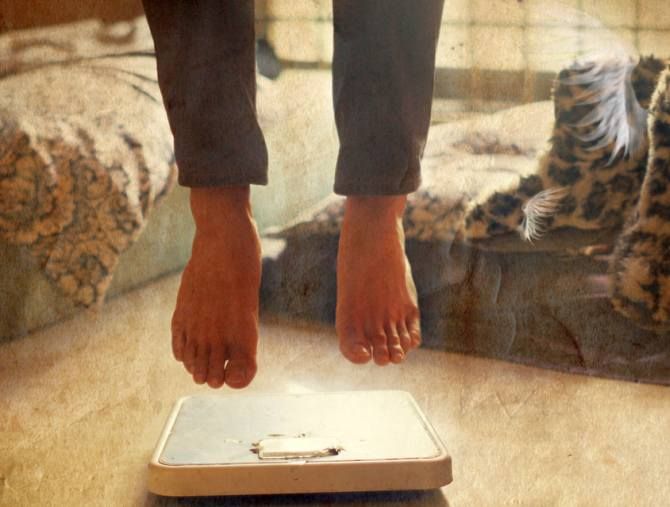You're still fat because the weight loss idiot in you hasn't junked this ONE unwanted habit yet!

Photographs: Jannino :p/Creative Commons
Are you a regular at the gym and still worried that you're not seeing a change in your weight?
Are you following a nutritious diet and still cribbing that you've not lost a single gram?
Are you combining exercise with healthy eating and still don't see those numbers drop?
If so, then your worries end here: we reveal one habit you've ignored that you need to put an end to.
Yes, friends. Stop checking your weight day in and day out and stop measuring your success by those numbers on the weighing scale.
Wondering why?
Here's how those numbers are stopping you from becoming a leaner and fitter person.
1. They pile on the pressure

Image courtesy: giphy.com
First, you need to understand that daily weight fluctuations are normal. Weight is just an over-hyped number and in no way is it an indicator of your failure or success. If you drink a gallon of water and step onto the scales, you'll notice a sharp increase in your weight.
Does that mean you've put on fat? Of course, not.
Once you register this fact, you'll slowly free yourself from the daily struggle with your weighing scale.
2. The numbers prevent you from thinking rationally

Image courtesy: giphy.com
Even a small increase in weight instantly depresses you. Quickly, you start making faces, and in no time at all you start planning another diet to work on. 'I'm going on a liquid diet from today', you announce.
You make new and ridiculous diet plans. And why?
Because that scale just threw you a number you don't like. There goes your peace of mind!
3. They push you towards emotional eating

Image courtesy: giphy.com
An increase in weight forces you to think that you're going wrong with your fitness routine. The sinking feeling increases your chances of reaching out for that bag of chips! Emotional eating can derail your fat loss goals. So, don't let a bunch of numbers sabotage your peace of mind.
Remember, you can only win the battle of the bulge if you keep calm.
4. Numbers don't tell the true story

Image courtesy: giphy.com
Don't be mad at me if I say that your weighing scale is a notorious little devil! It doesn't just weigh fat. It also weighs water, bones, muscles, internal organs and more.
If your scale shows a dip in your weight, this doesn't mean that you've lost fat. And vice-versa, i.e. if it shows an increased number, you haven't necessarily gained fat.
I'm sure you wouldn't mind the second scenario, if losing fat and getting leaner are your primary goals. And trust me, if you've lost muscle and are celebrating a dip in weight, you're fooling no one but yourself.
Remember, the more muscle mass you have, the more calories your body burns -- even if you're only sitting around!
5. Those numbers programme your mind not to lose weight!

Image courtesy: giphy.com
Have you ever complained about your weight being stuck on one number for quite some time? Do you know why that happens?
Scientifically, it's called a plateau, a stage where you need to either bring about a change in your diet or your workouts to break even. However, believe it or not, this has a lot to do with the number of times you've stepped onto that scale.
Researchers claim that when you keep seeing the same number your mind assumes that's the ideal weight and the body then refuses to let go of all the unwanted fat below that point.
So, let go of that number and just focus on your fitness routine. You'll be surprised to see how beautifully this works.
6. The scale doesn't have a mind of its own

Image courtesy: giphy.com
In a book titled 'Body Fueling', author Robin Landis compares muscles and fat to gold and feathers. This clearly suggests that you must get rid of all the dumpy and bulky feathers (fat) and retain, in fact, pile on the sleek gold (muscle).
Unfortunately, the weighing scale does not help you differentiate between the two. It cannot tell you whether you've lost fat or gained lean muscle mass. Hence, the best way to find out if you're on the right track is to use other techniques like body composition analysis or skin-fold calipers, which give you a better sense of your progress.
Better measurement tools
How do you feel? Do your jeans fit better? Has your ring gone slightly looser? Do your muscles feel tighter? These are the best tools for measuring your success. And c'mon if you can feel and see the difference, in no time, others too will notice the change in you. So, don't waste time and don't let those numbers scare you: soldier on.
After all it is a matter of mind over scale!
Also Read:











